THE SEVEN SEAS
KOMODO NATIONAL PARK
Jurassic Park Revisited
THE SEVEN SEAS
KOMODO NATIONAL PARK
Jurassic Park Revisited
THAR BE DRAGONS'
Komodo National Park is recognized as a UNESCO World Heritage site for its stunning diversity of natural beauty, Komodo National Park is without a doubt, one of the best places on earth to explore on a liveaboard boat trip.
From trekking the savannah for an up-close encounter with the legendary dragons to exploring an unbelievable variety of dive sites, Komodo offers an unforgettable for every guest aboard the Seven Seas. Komodo was our very first destination on The Seven Seas – let us show you the very best of this world-class adventure travel and scuba diving destination.
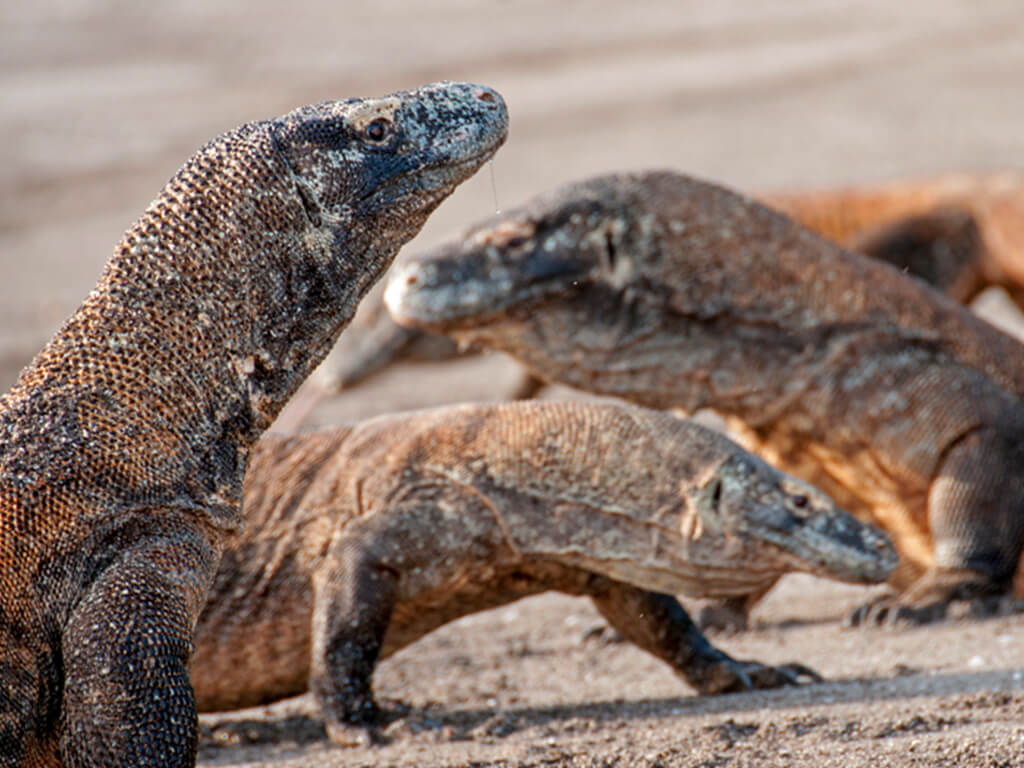

THE ISLANDS
The warning etched on maps at the boundary of the known world by the earliest cartographers – inspired by the mythical dragons of Komodo. Old world mariners avoided venturing anywhere near these fearsome beasts – leaving their pristine habitat to remain a gem of biodiversity both above and below the surface of the Flores Sea.
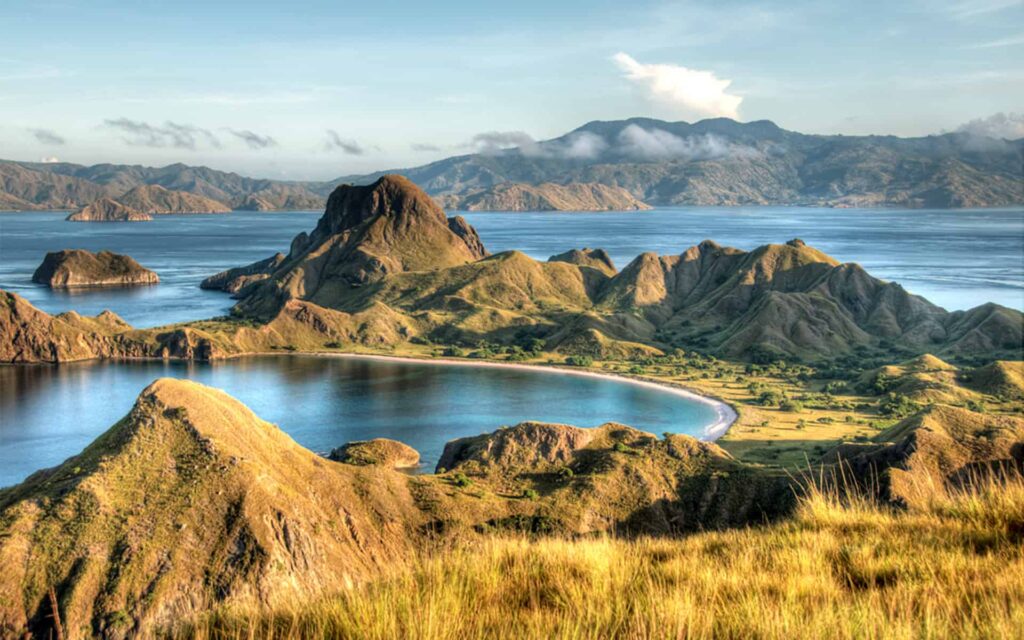
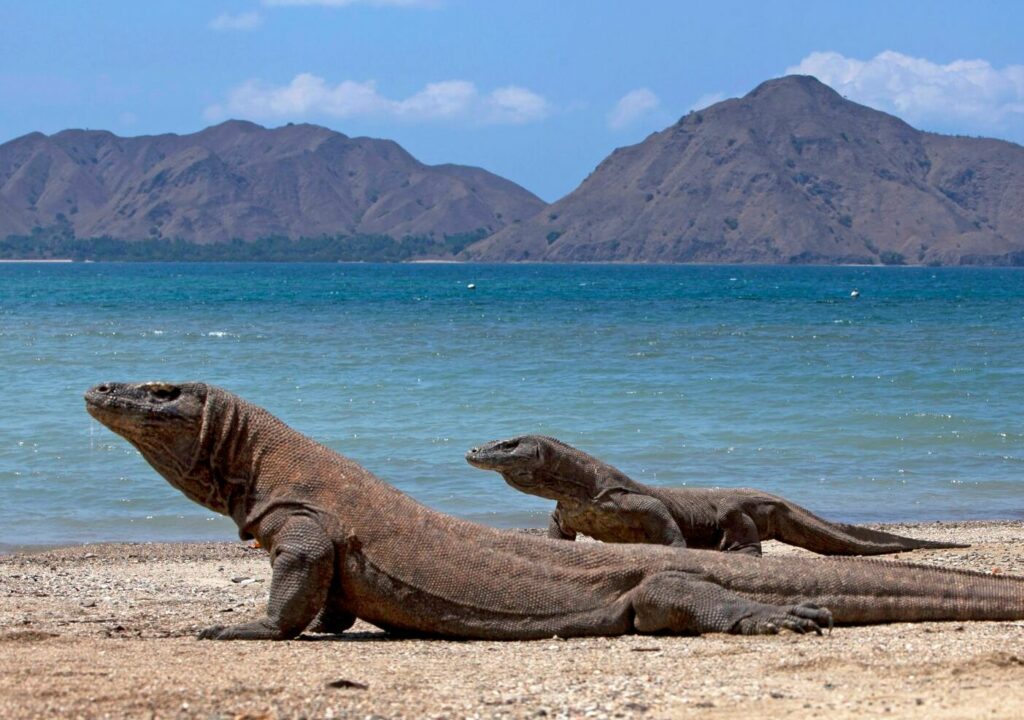
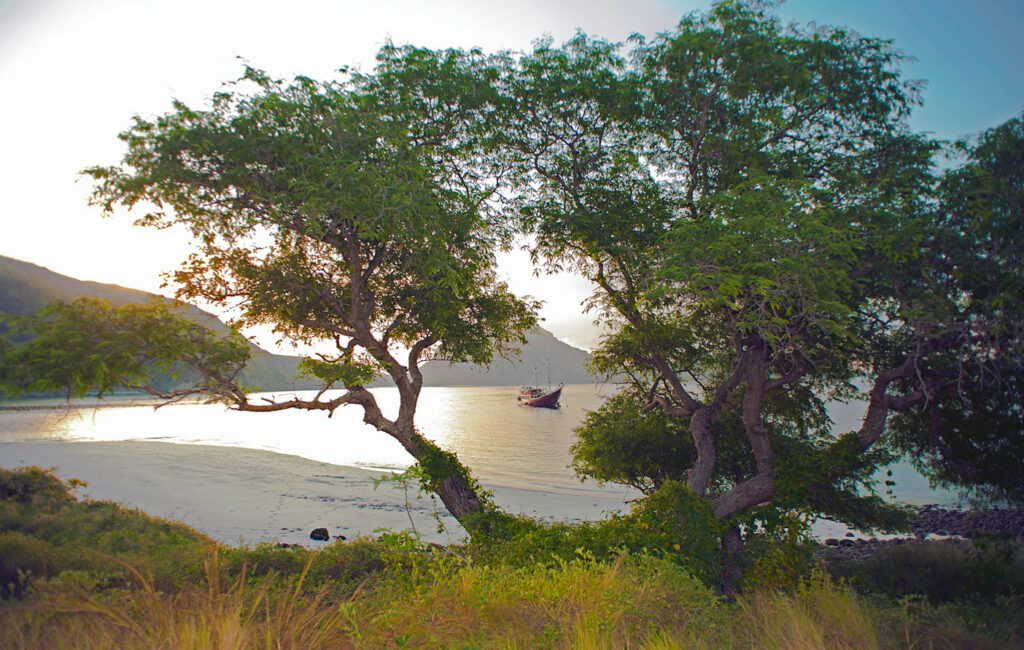


Komodo National Park was created in 1980 to protect the dragons and other rare and unusual wildlife here. Recognized as a UNESCO World Heritage site in 1991, Komodo has since been named as one of the ‘World’s Top Ten Destinations’ by National Geographic Magazine in the July 2017 edition.
For adventurers aboard the Seven Seas, Komodo is one of our top cruising destinations – beloved by divers, wildlife enthusiasts, and outdoor explorers alike.
The Park itself includes a trio of large islands (Komodo, Rinca, and Padar), interspersed with an archipelago of smaller islands and seamounts.
Located at the boundary between the Indian and Pacific, these two great oceans are home to completely different marine environments. Driven by this confluence of oceans, the Indonesian Flow Through creates a net north to south current within the Flores Sea, which surrounds Komodo Park. Powerful tidal currents draw nutrient-rich Indian Ocean seawater to the northern reaches of the park, allowing a unique and unforgettable variety of species to mix here.
The end result is a stunning diversity of habitats and species in a relatively small area – enabling us to introduce you to an incredible variety of dive sites and marine environments with a minimal amount of travel time between your adventures.

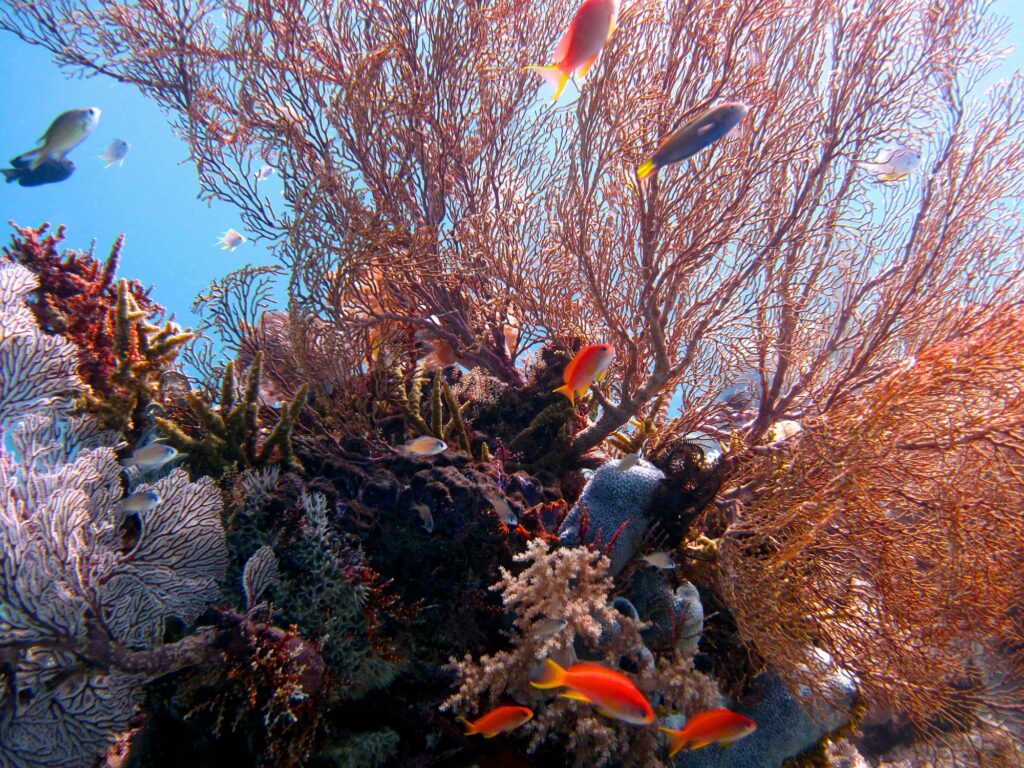
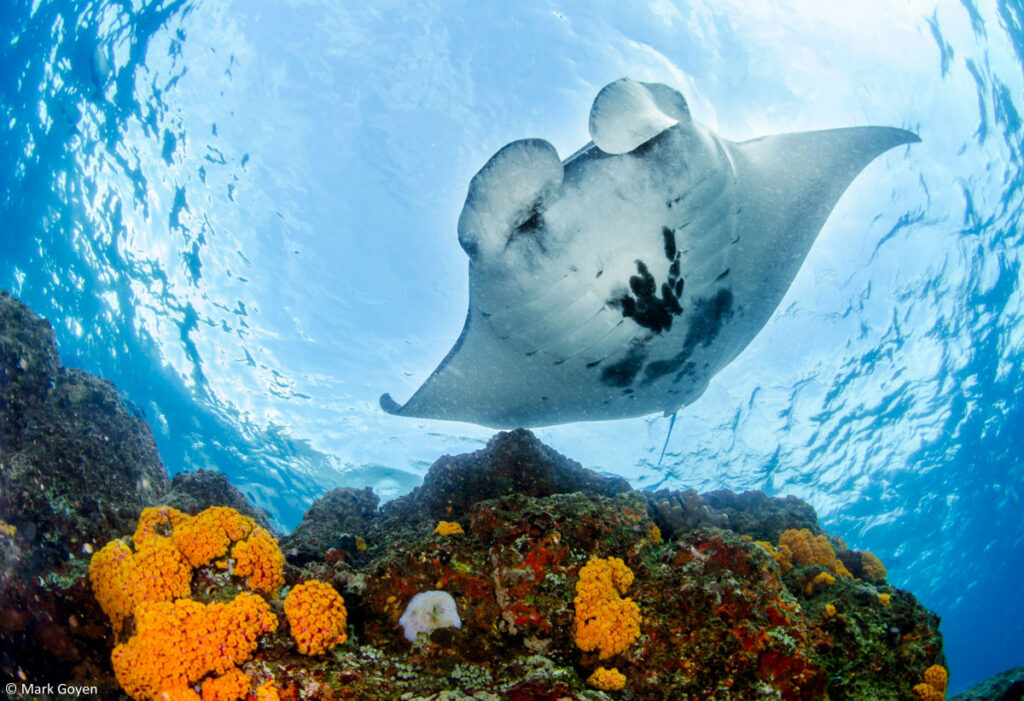

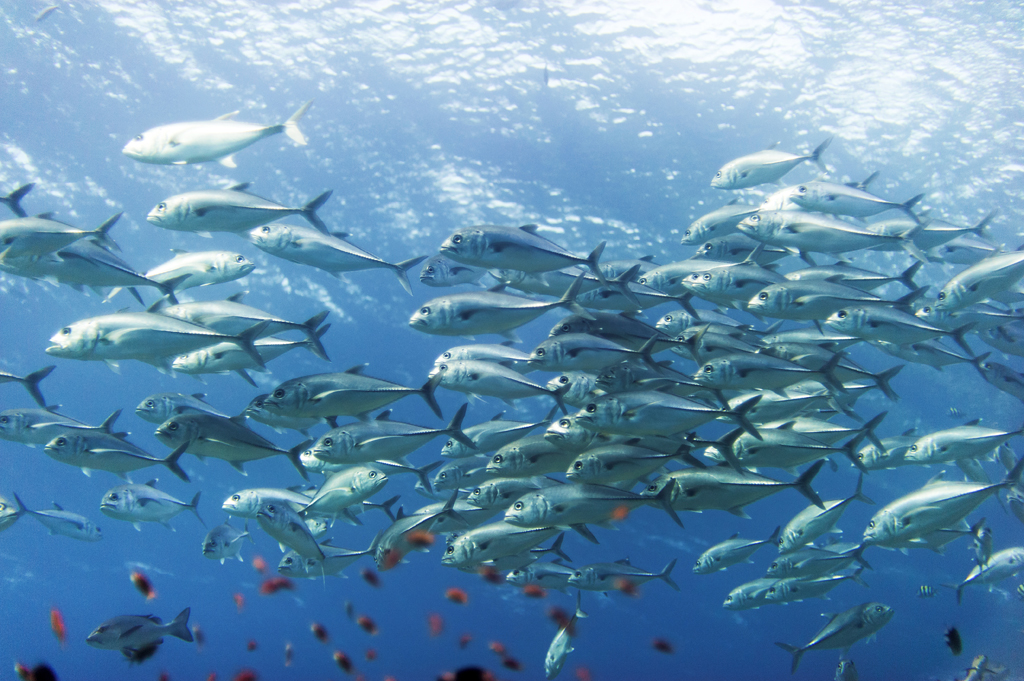
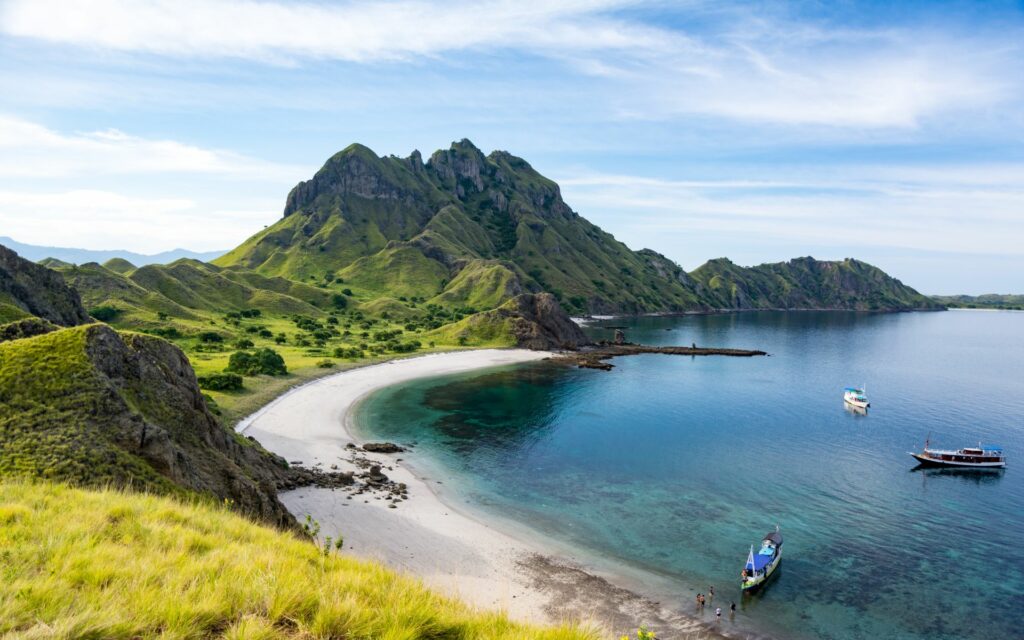
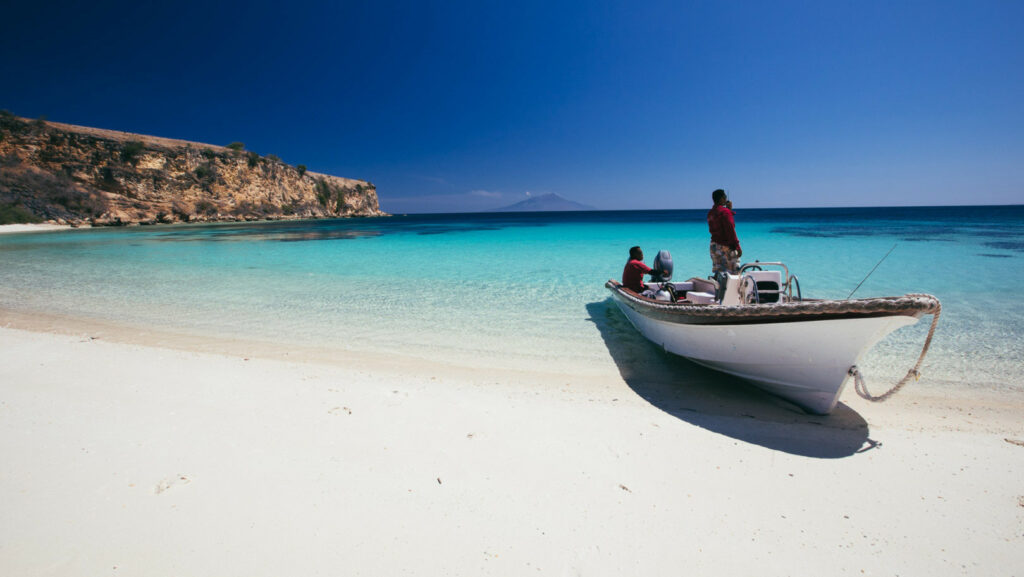
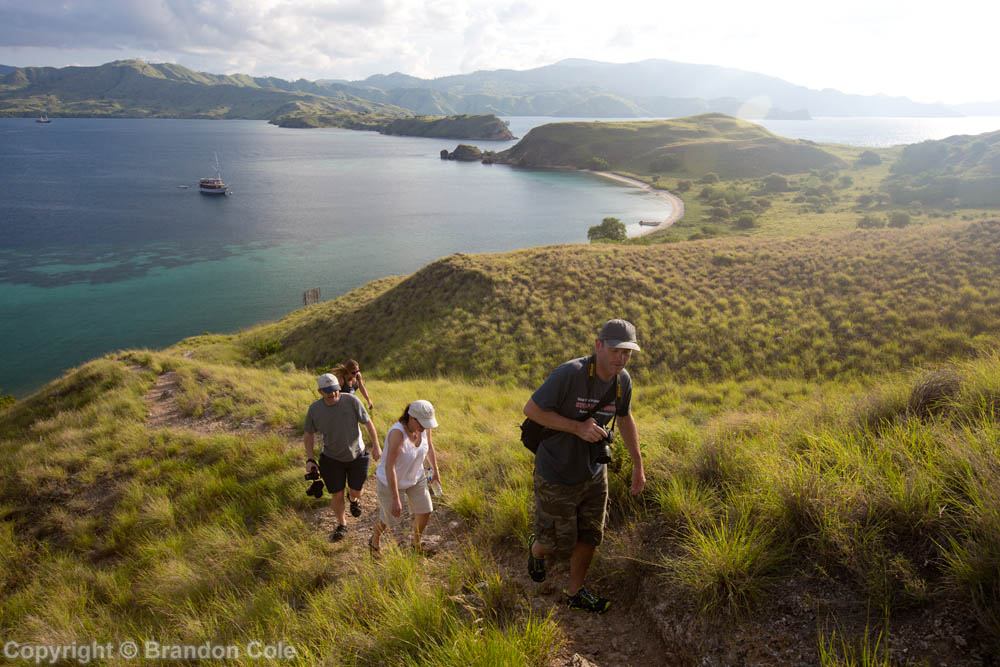
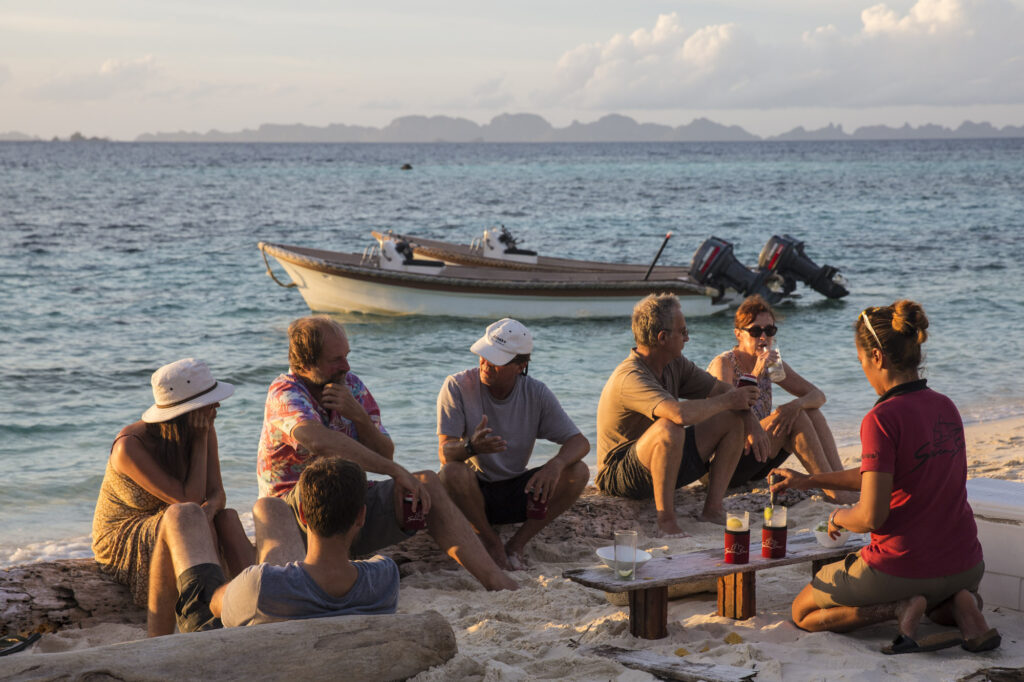
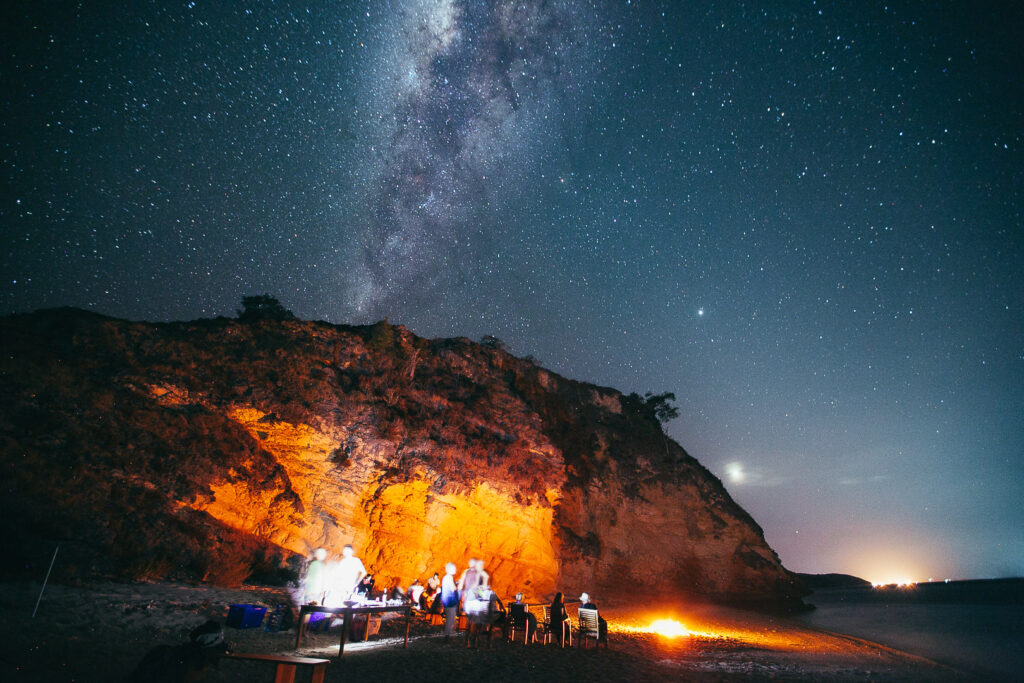
The rugged savannah of the islands within Komodo Park contrasts dramatically with the sapphire-blue seas and hidden beaches scattered across this amazing natural wonderland. The relative lack of rain and humidity makes Komodo an ideal trekking destination, the perfect change of pace after a pleasant morning spent exploring a coral garden or drift diving a seamount.
Padar Island – one of Komodo National Park’s most iconic landscapes – is a spectacular afternoon or early morning hike, offering panoramic views of craggy mountains towering above a crescent of stunning white sand beach.
On most nights, we’ll venture ashore to a secluded beach for drinks and hors d’oeuvres, often accompanied by an improvised performance of acoustic guitar music from our multi-talented crew.
As the last colors fade over the western horizon, the stars begin to glow in the clear air of the night sky. Komodo is miles and miles away from any large city, allowing the full crescent of the Milky Way to be seen on a moonless night. Dining on the top deck of the Seven Seas beneath a panorama of constellations is a sight not soon forgotten.
Beyond the world-class diving, Komodo offers our adventurous guests the opportunity to explore secluded beaches and stunning shallow water coral gardens by sea kayak or stand up paddle board. The Park is also home to the famed ‘Pink Sand Beach’ – one of only seven such beaches known anywhere on earth. Sheltered lagoons with mirror-calm seas are perfect for waterskiing or skurfing – a favorite activity of our spirited crew, who love to put on a lighthearted show on the water behind one of our twin-engine tender boats.
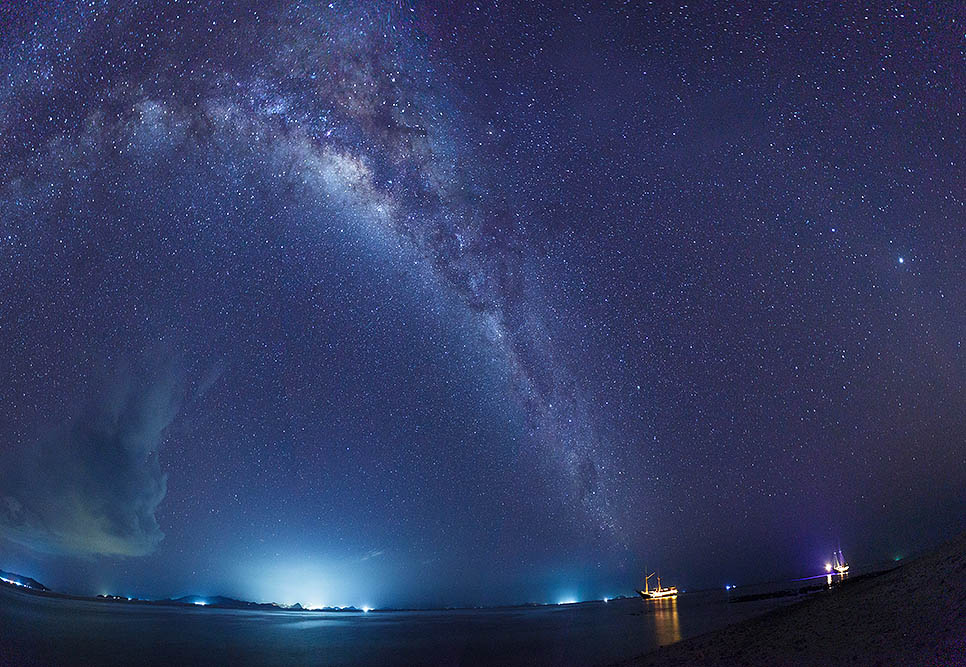
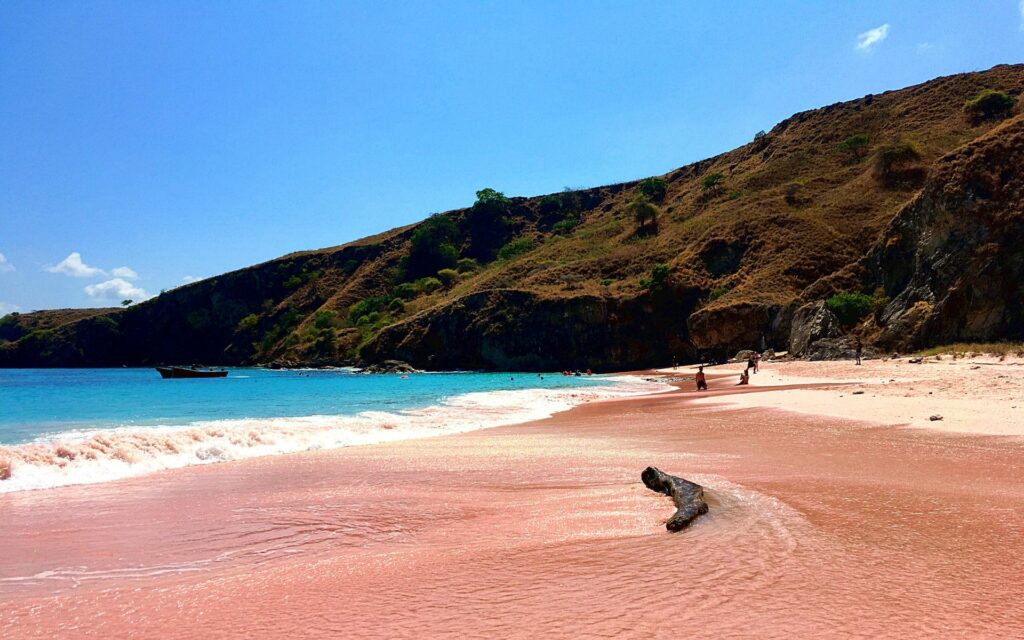

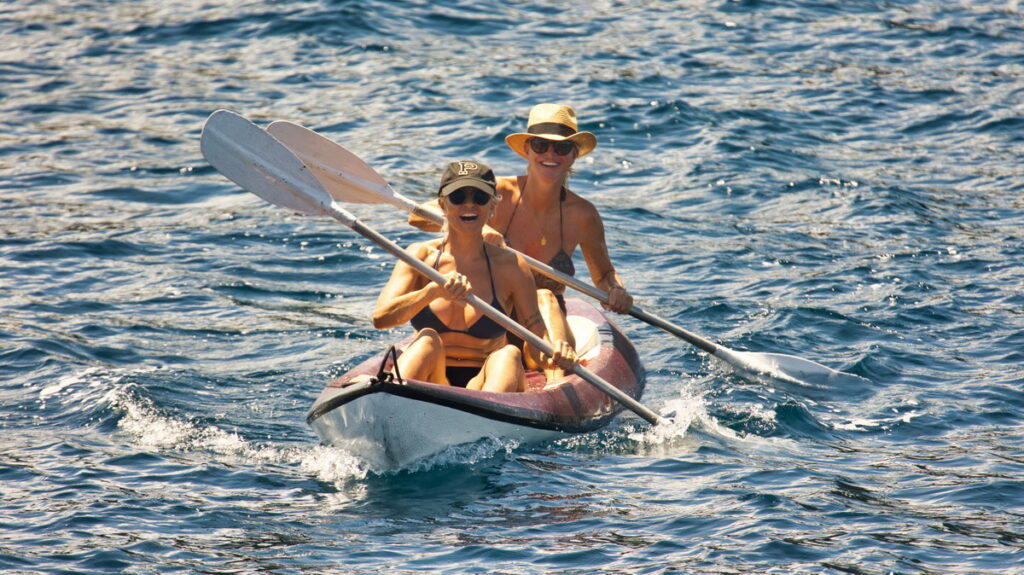

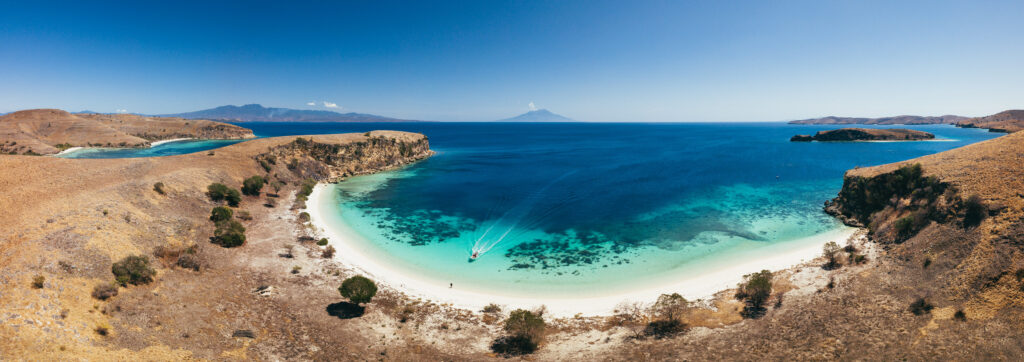

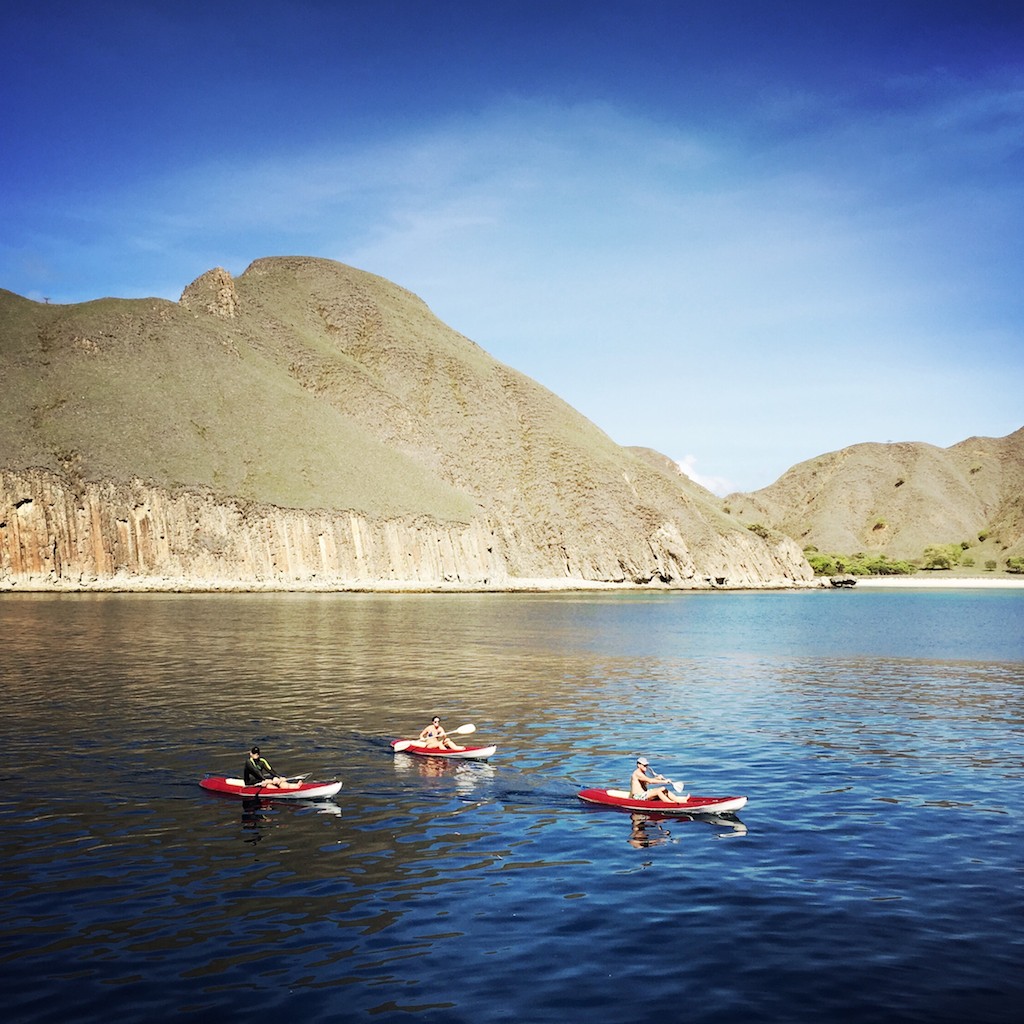
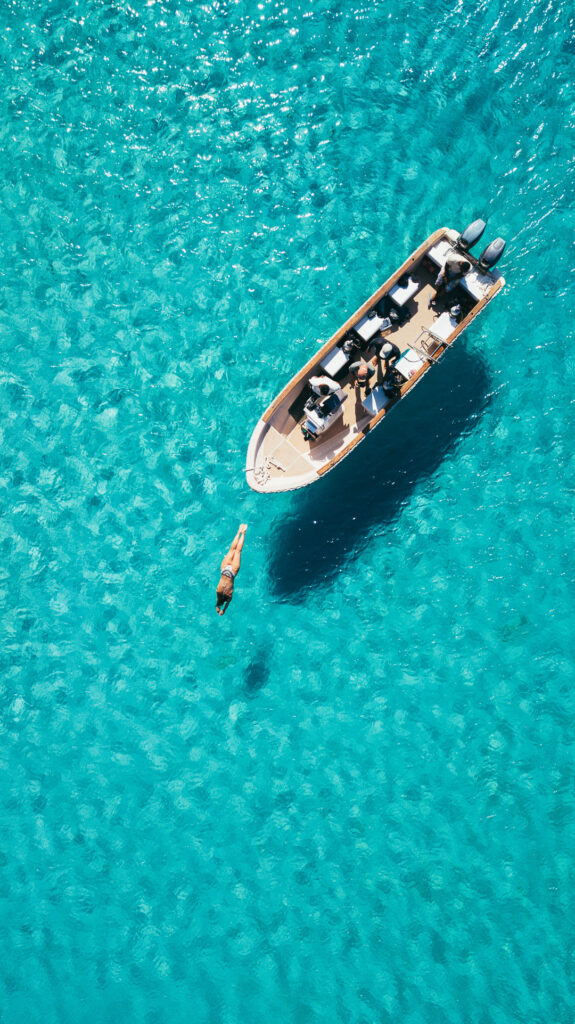
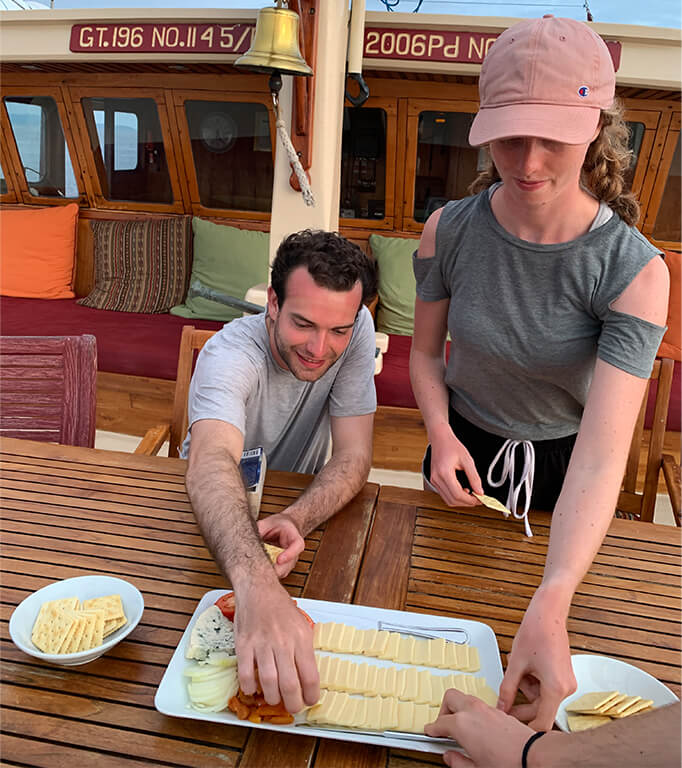
With so many highlights spread across the more than 1,700 square kilometers of Komodo National Park – the vast majority accessible only by boat – the Seven Seas liveaboard offers the ultimate platform for getting the most out of your precious time exploring the park.
You’ll wake up to a new, jaw-dropping destination every morning – spend the day diving, trekking the rugged savannah, sea kayaking, stand up paddling, or just pausing to take in another stunning panoramic view from the comfort of our upper lounge while sipping a sunset drink or enjoying a pre-dinner snack.
Our core itinerary includes the very best highlights of diving and exploring Komodo National Park. However, recent exploratory expeditions have led us across the Sape Strait to discover an untouched paradise in the south of Sumbawa. This remote region of Indonesia offers some of the best beaches to be found anywhere – sparkling sapphire seas fringed by deserted white sand beaches without another soul in sight.
We invite you to join us on the adventure of a lifetime, exploring the very best of Komodo National Park.
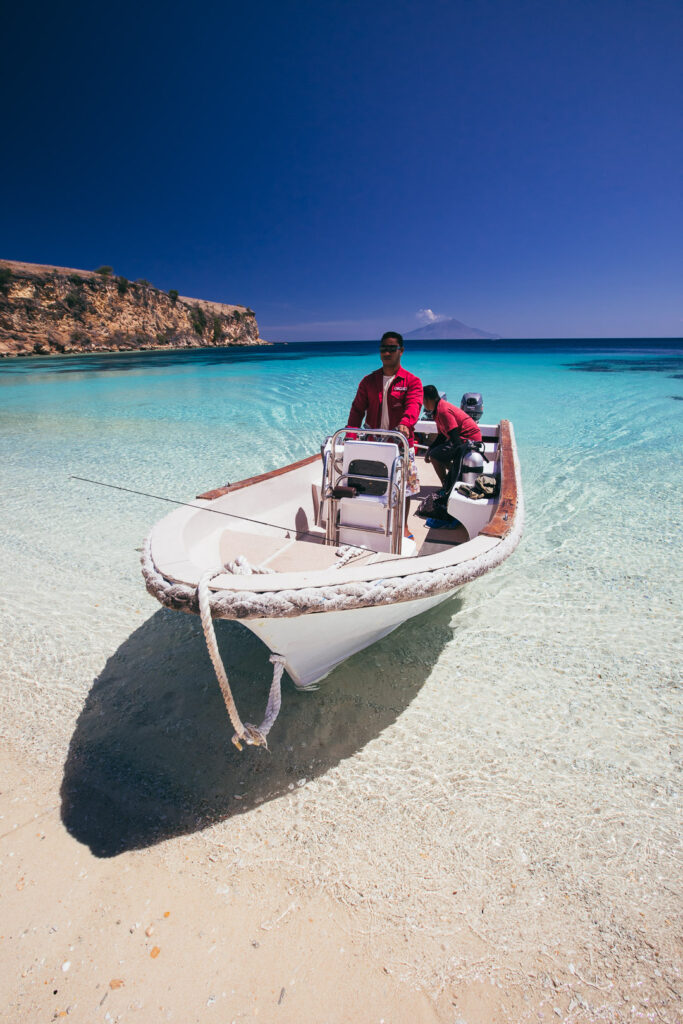
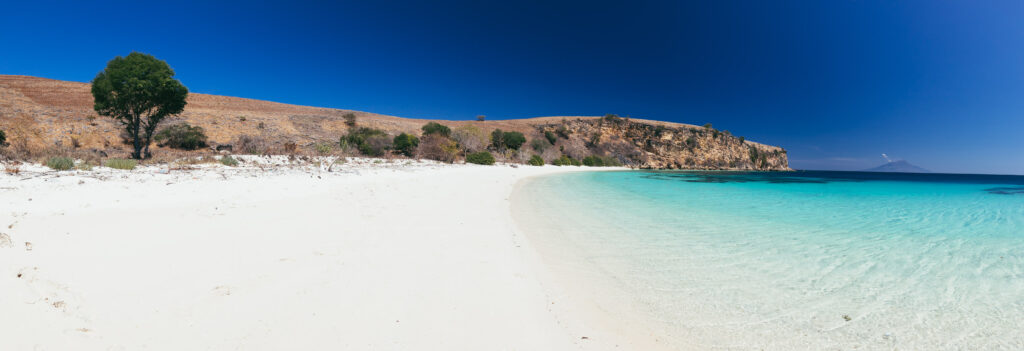

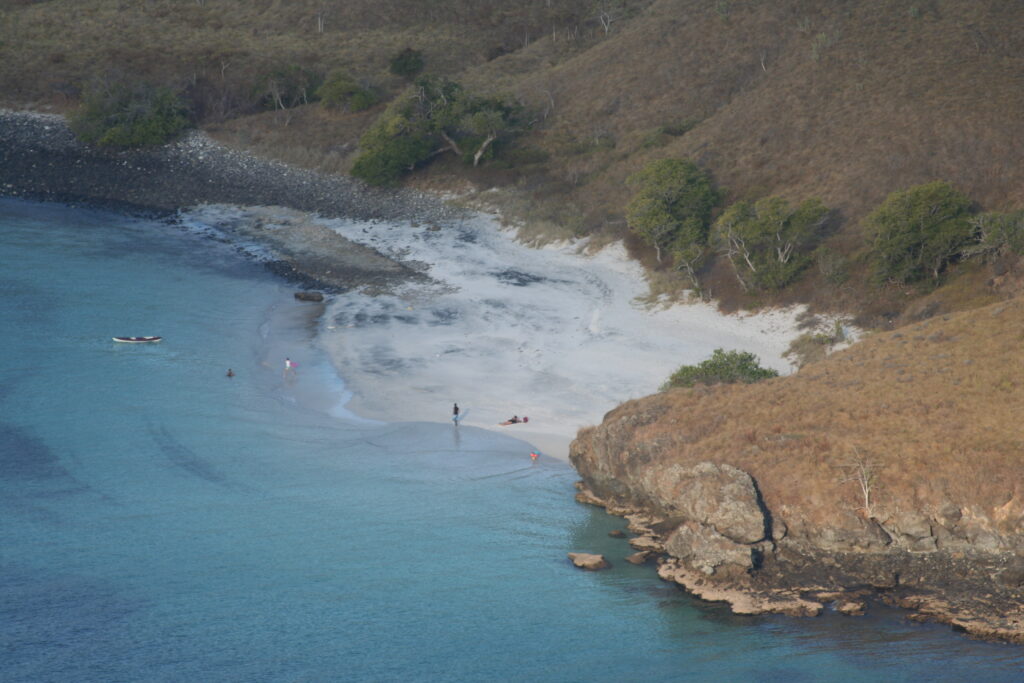
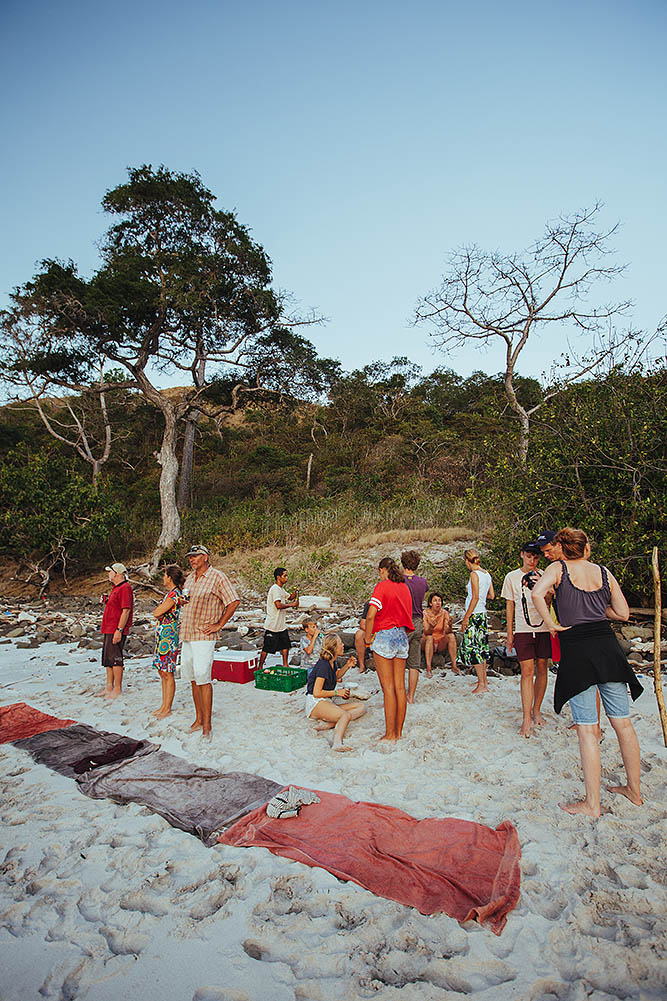
THE DIVING
Home to more than 1,000 species of fish, 260 species of coral, and offering the chance to glimpse rare marine mammals such as the dugong and sperm whale, Komodo National Park is the trip of a lifetime for divers of all experience levels.
Komodo’s underwater landscape is as diverse as the species that live here. You’ll discover dive sites from high-adrenaline sea mounts swirling with sharks and pelagic species, to underwater canyons with feeding mantas, to classic wall dives, to gently sloping coral gardens, to cave swim-throughs, to Komodo icons like Manta Alley and Batu Bolong – there’s enough variety here to last a lifetime of diving without getting bored.
You’ll traverse the warm waters of the Flores Sea in the north, also exploring further south into the Indian Ocean – the water becoming gradually cooler as you near the open ocean.
Underwater photographers and naturalists thrill to see rare species such as pygmy seashorses, nudibranchs, blue-ringed octopus, false pipefish, and frog fish – all spotted for you by our expert dive guides.
Wide angle and blue water enthusiasts can catch a glimpse of giant pelagic species, several varieties of whale (including blue), dolphins, three species of sea turtle, mantas, a variety of reef and blue water sharks, as well as the extremely rare and shy dugong.
Seldom-seen species such as ocean sunfish (mola mola), eagle rays, whale sharks and mako sharks have also been spotted. We have even heard reports of a sighting of the elusive megamouth shark.
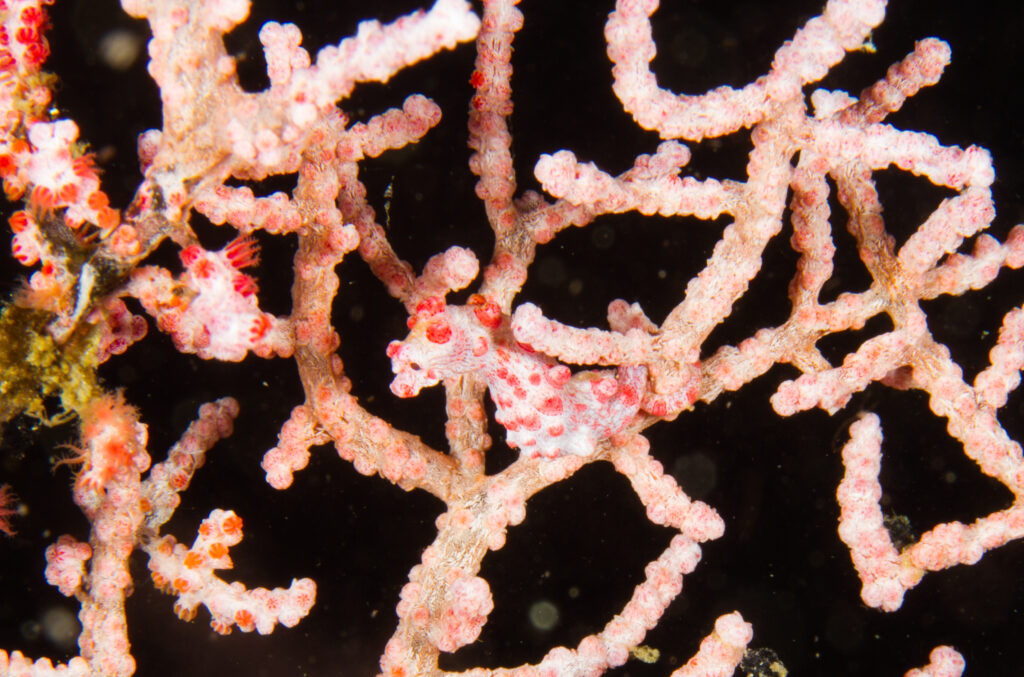
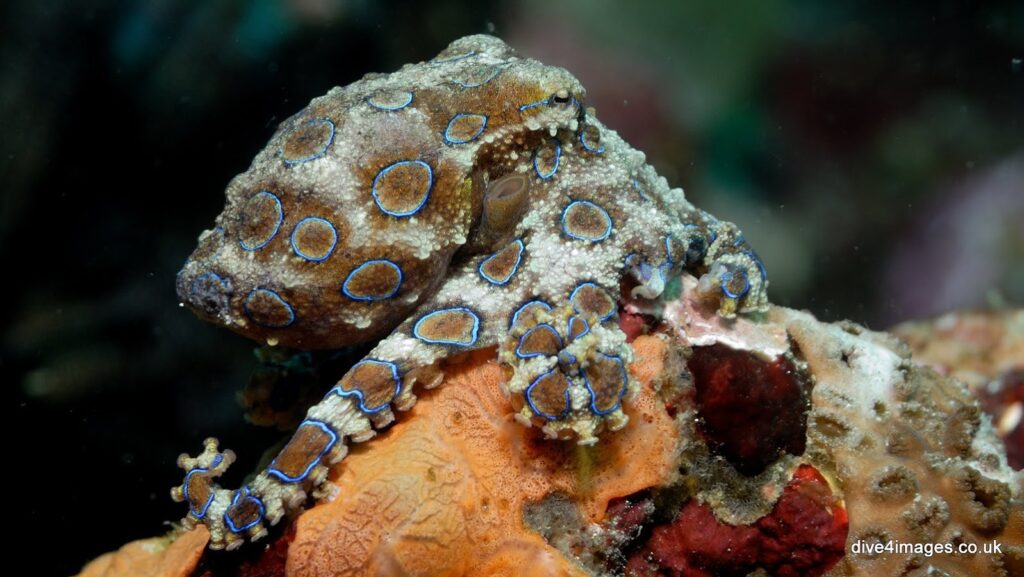

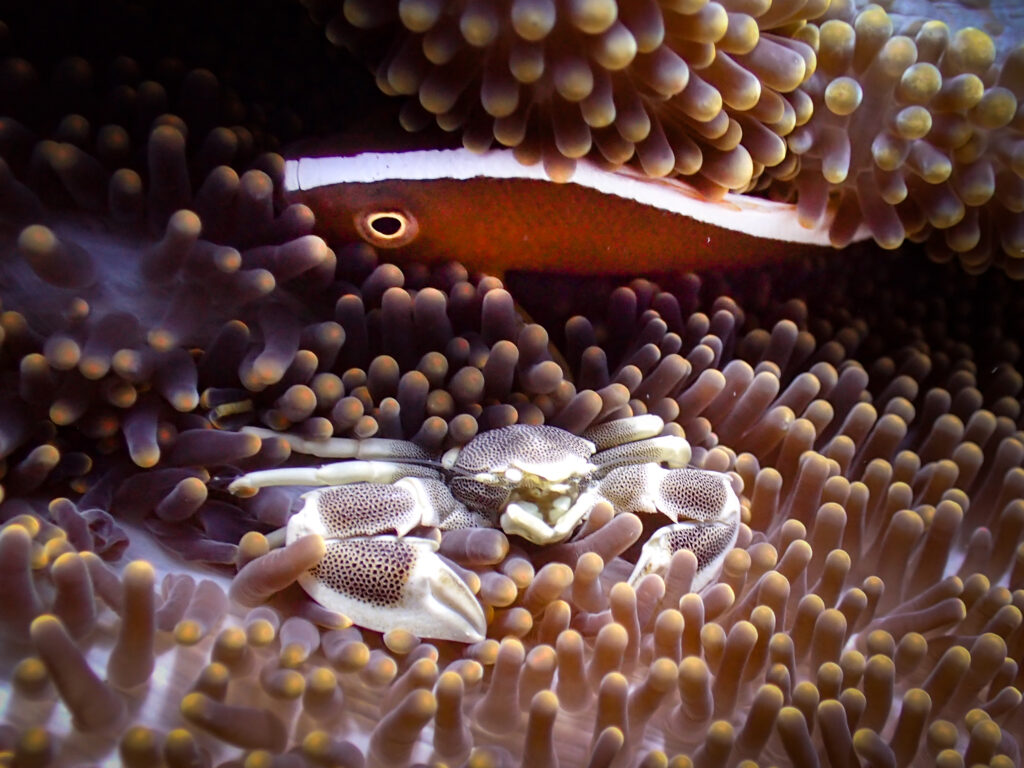
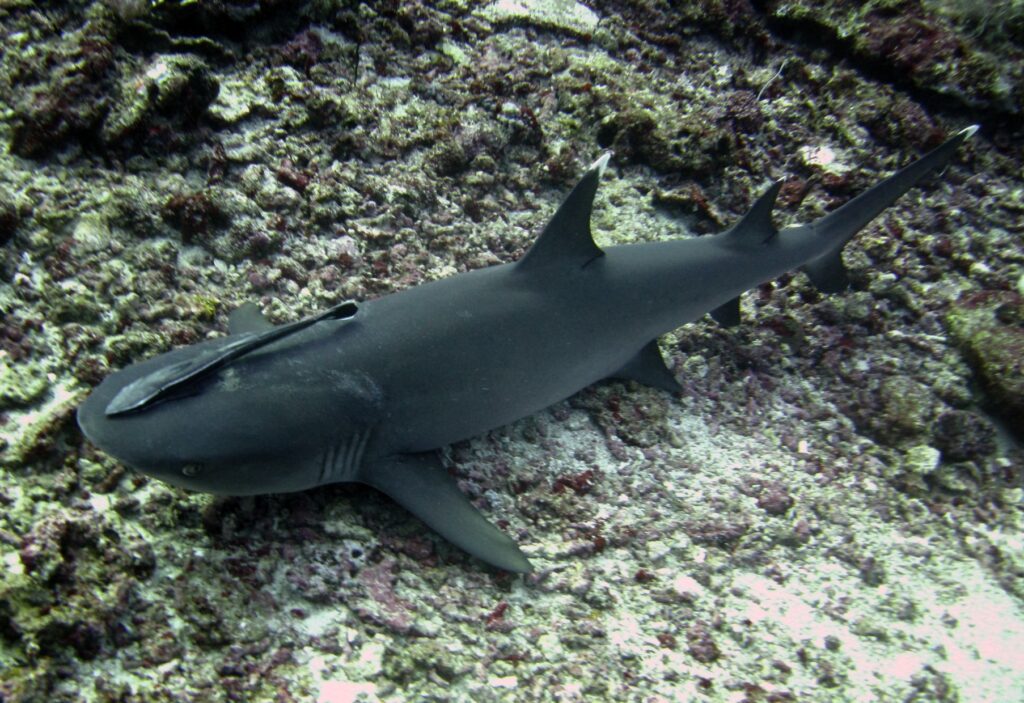
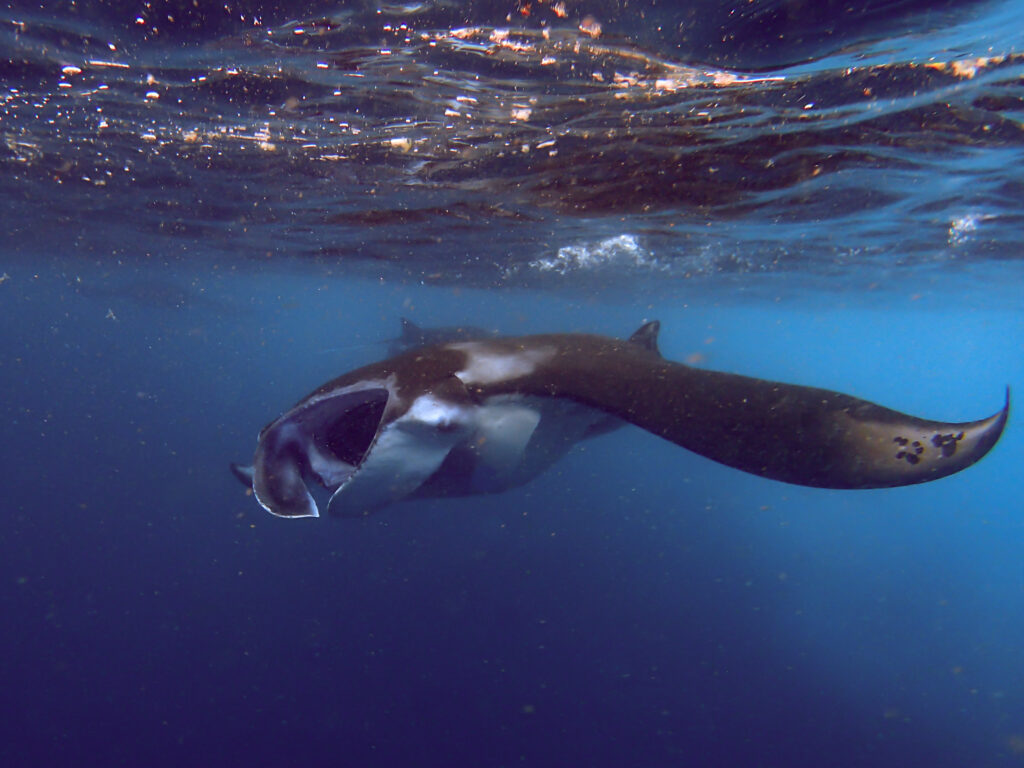
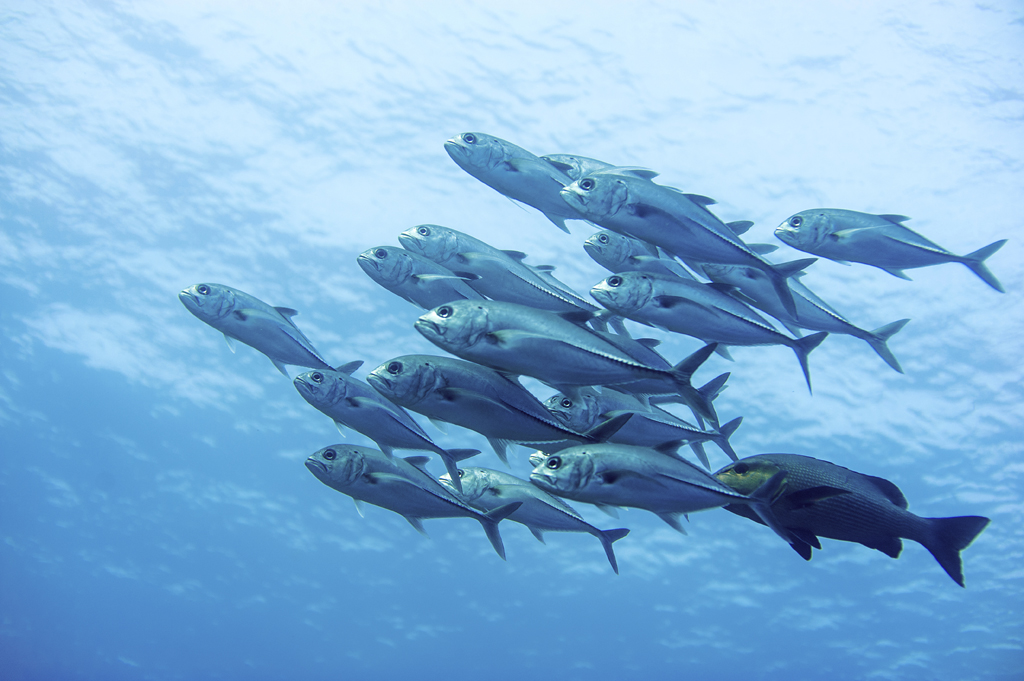
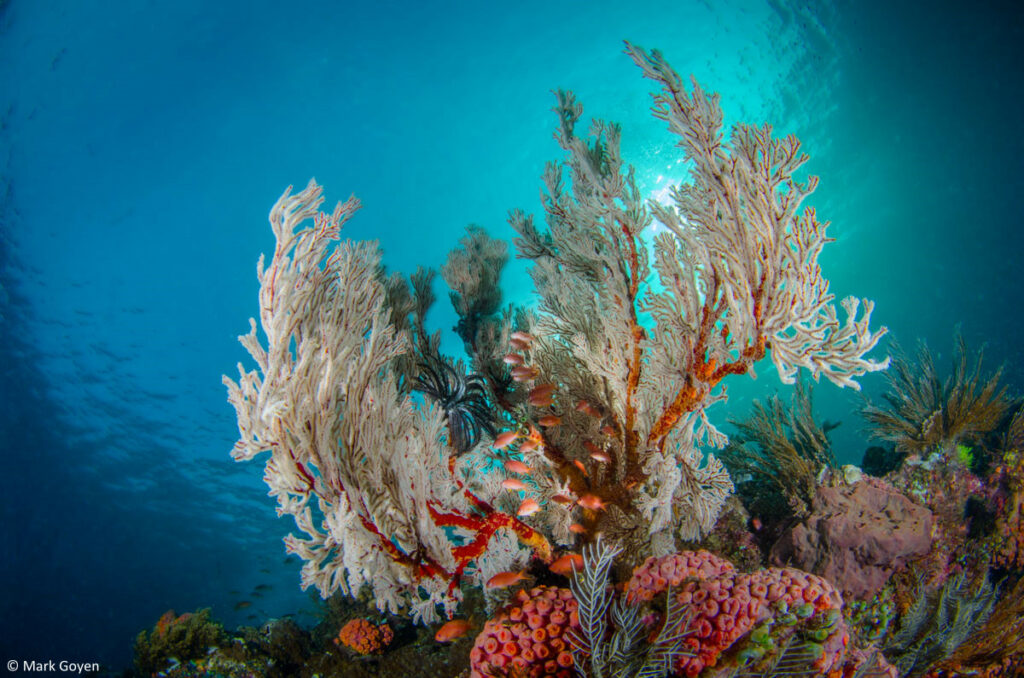
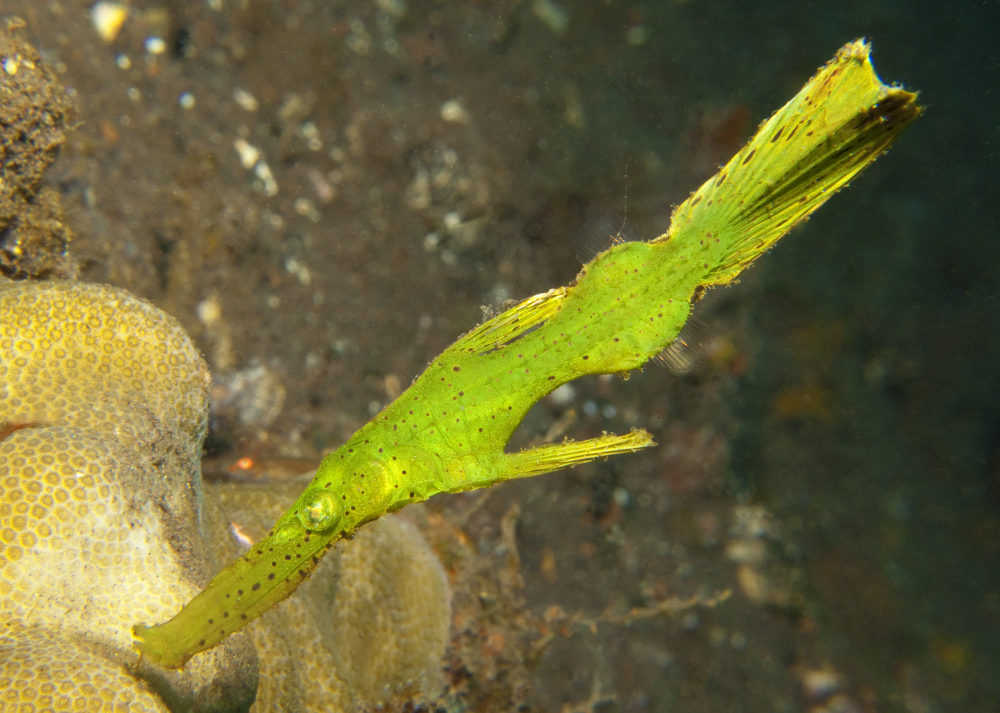

We’ll introduce you to Komodo’s most iconic dive sites such as Manta Alley, Manta Point, Tatawa Besar, Batu Bolong (Hollowed Rock), Castle Rock, and Crystal Rock. We’ve also discovered many of our own favorite spots over the years, such as the ‘Seven Seas Secret Spot’, where we’ve sometimes spotted dugong cruising the shallows.
With more than a decade of experience exploring the best that Indonesia has to offer, you can be assured that your cruise director, divemasters, and crew aboard the Seven Seas will always work to have you diving the right place at the right time. Most (if not all) dive sites are dependent on the tide, moon, and other environmental conditions – get there at the wrong time and you’re likely to miss that unforgettable experience underwater.
Our newest cruises have ventured into the South of Sumbawa, where we’ve discovered a variety of dive sites which offer even more options than those you’ll find within Komodo Park. From a kaleidoscopic soft coral paradise, to an exquisite shallow water reef of branching coral and teeming with tropical fish and cruising baby black tip sharks, to an incredible sandy slope inhabited by a squadron of enormous sting rays.
With our wealth of experience in Komodo and beyond, your crew aboard the Seven Seas invites you to experience this jewel of the Coral Triangle at its very best.

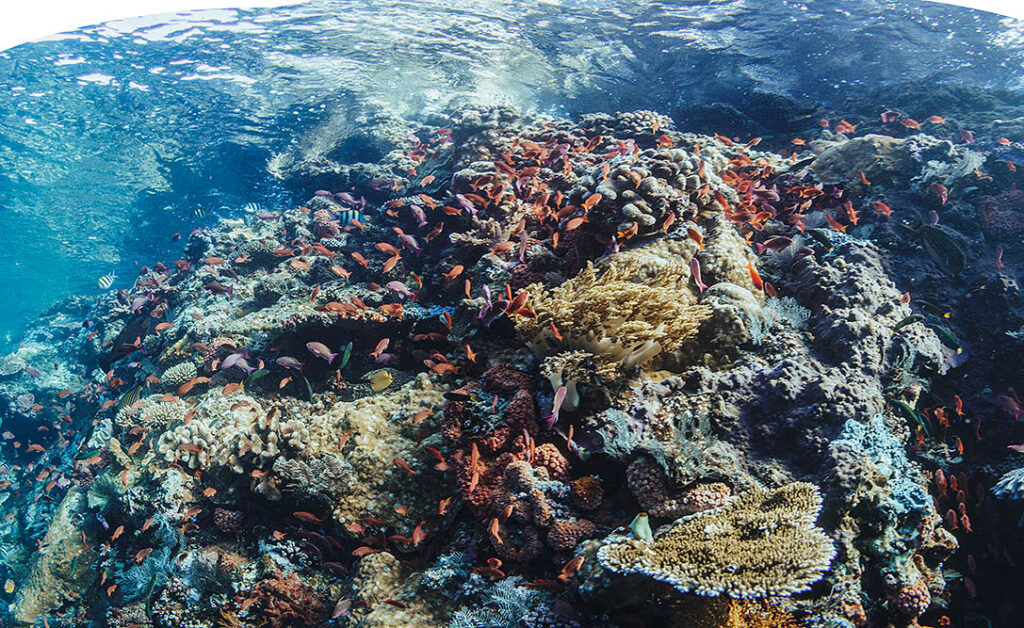

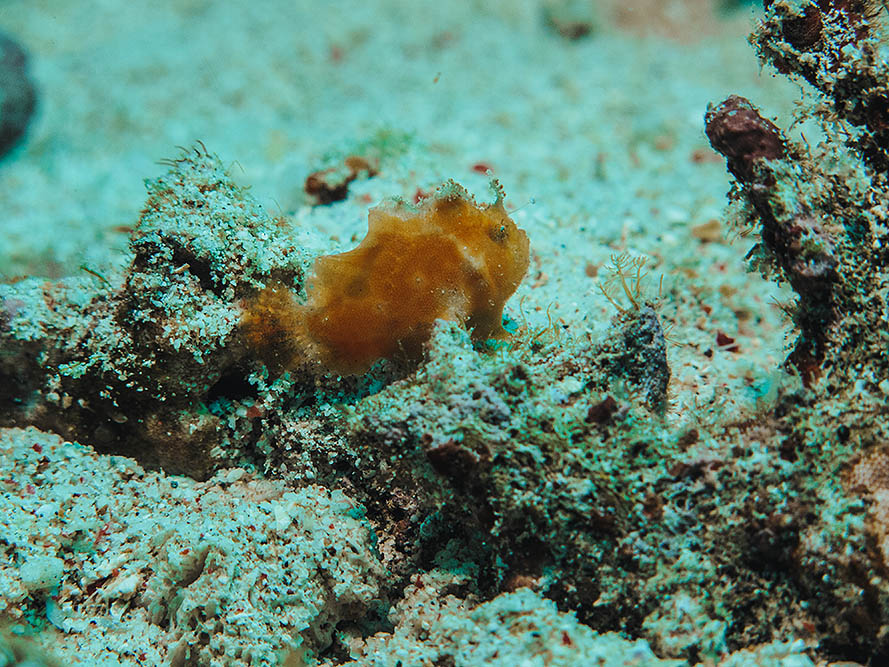

Watch the Exploration
Komodo - Sumbawa May 2024
The Seven Seas Liveaboard 440 views
Exploring Komodo, Flores & Alor | Epic Diving Odyssey | Indonesia | The Seven Seas | 4K HDR | 2024
The Seven Seas Liveaboard 1K views
Land Of Dragons 2023
The Seven Seas Liveaboard 479 views
Chapter #14: KOMODO. Out of the Black & Into the Blue
The Seven Seas Liveaboard 2.3K views
"Le Gang des Plongeurs Fous" in Komodo - Indonesia - May 2012
The Seven Seas Liveaboard 2.2K views
Komodo Family Trip July/August 2013
The Seven Seas Liveaboard 455 views
Komodo Beneath the Waves by Mike Boom, Oakland, California
The Seven Seas Liveaboard 1.2K views
Big Fish Komodo
The Seven Seas Liveaboard 66 views
Komodo: From head to toes
The Seven Seas Liveaboard 255 views
THE WILDLIFE
Best known as the home of its eponymous dragons, these fearsome animals are the world’s largest lizard species – reaching three meters or more in length and weighing more than 70 kilograms. Komodo Park is believed to be home to more than 5,000 of these cousins to long-extinct dinosaurs. Feeding primarily on the fleet-footed Timor rusa deer, Komodo dragons are opportunistic feeders which ambush their prey in the arid underbrush – sometimes swimming long distances between the islands in search of new hunting grounds.
Other mammals found within the park are local varieties of water buffalo, wild boar, and crab-eating macaque. Twelve species of snake live within Komodo National Park as well as many varieties of lizards and frogs.

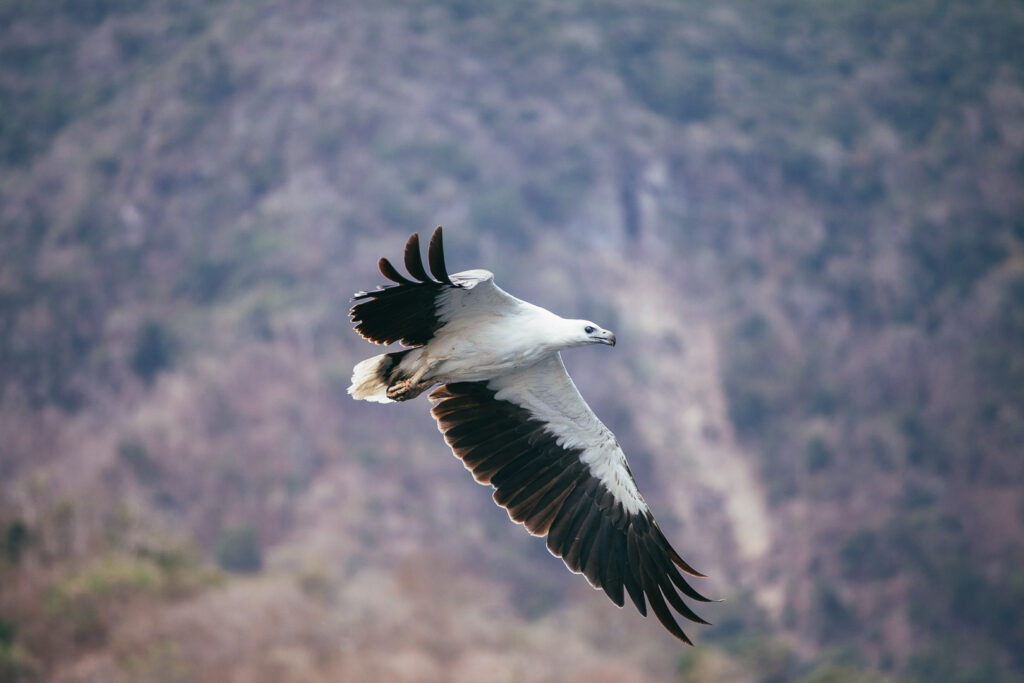
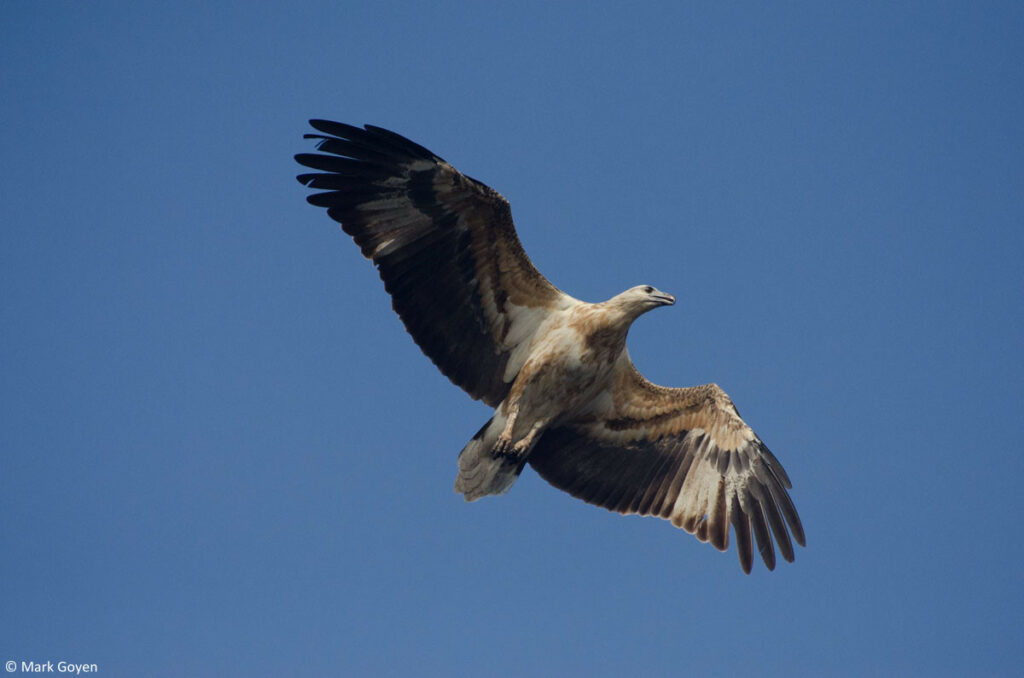
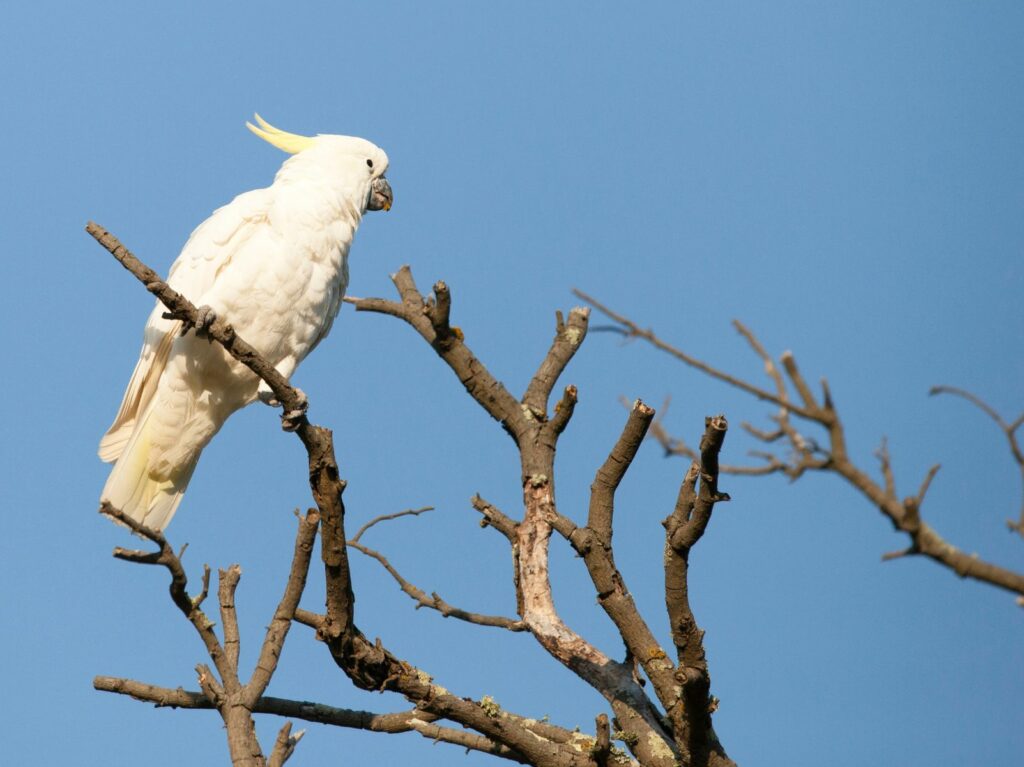
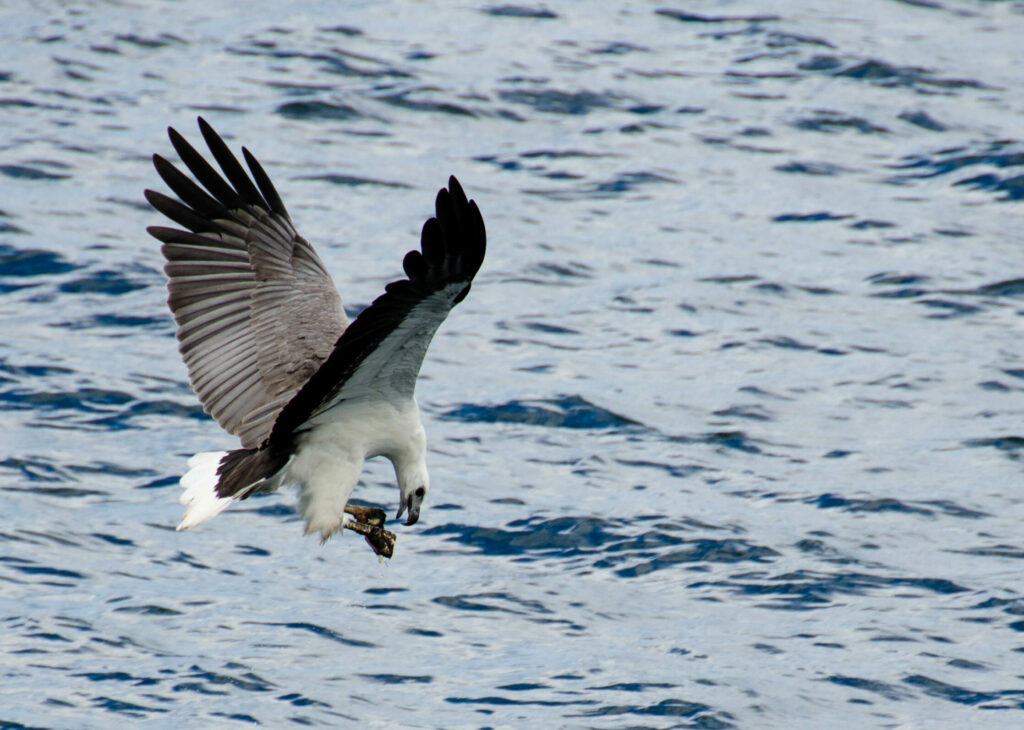
From our anchorages in the South of the Park, sharp-eyed guests have the chance to spot the incredibly rare Flores hawk-eagle, as well as the charismatic white-bellied sea eagle.
Other bird species seen flying Komodo’s skies include the great-billed parrot, green imperial pigeon, lemon-bellied white-eye, as well as the critically endangered lesser Sulphur crested cockatoo.
Seven Seas guests can choose to join an early morning hike, trekking the golden landscape of the savannah as the sun rises – a perfect time for spotting wildlife. The ranger station on Komodo Island itself offers several nature / wildlife treks that offer a near-guaranteed view of the Komodo dragon as well as other land species.
At twilight, we’ve found enormous groups of fruit bats careening across the darkening sky as they begin their night of searching for food. Other wildlife land trips include a caving expedition where more varieties of bat can be seen.
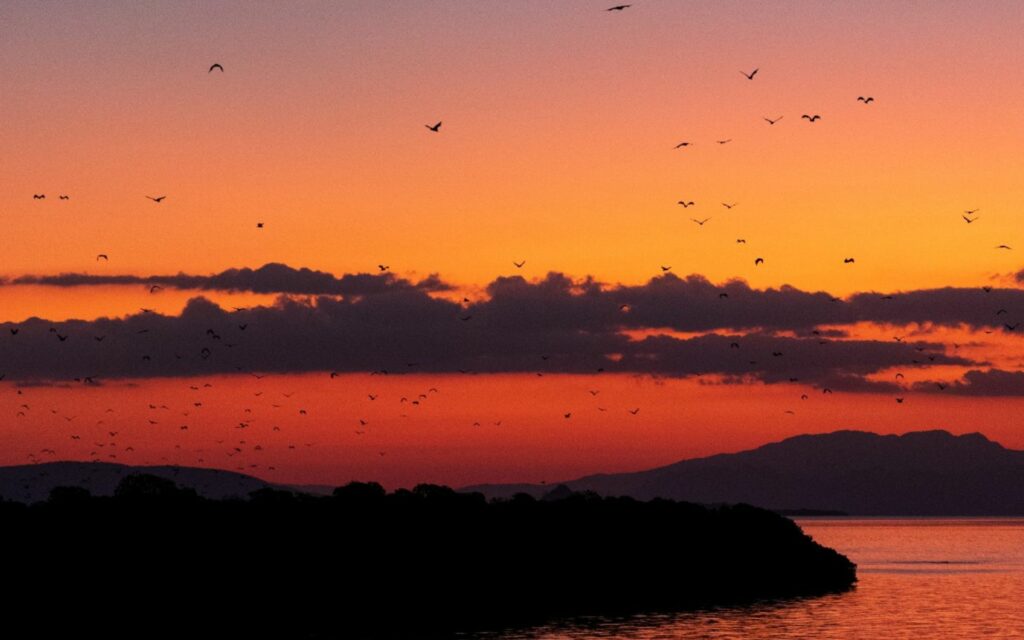
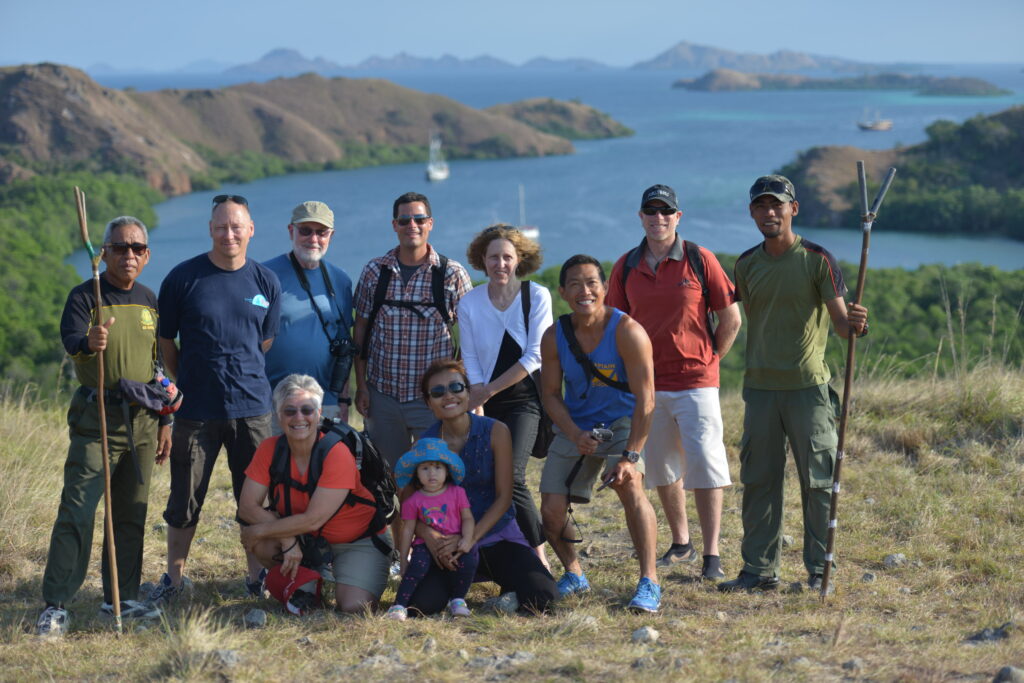

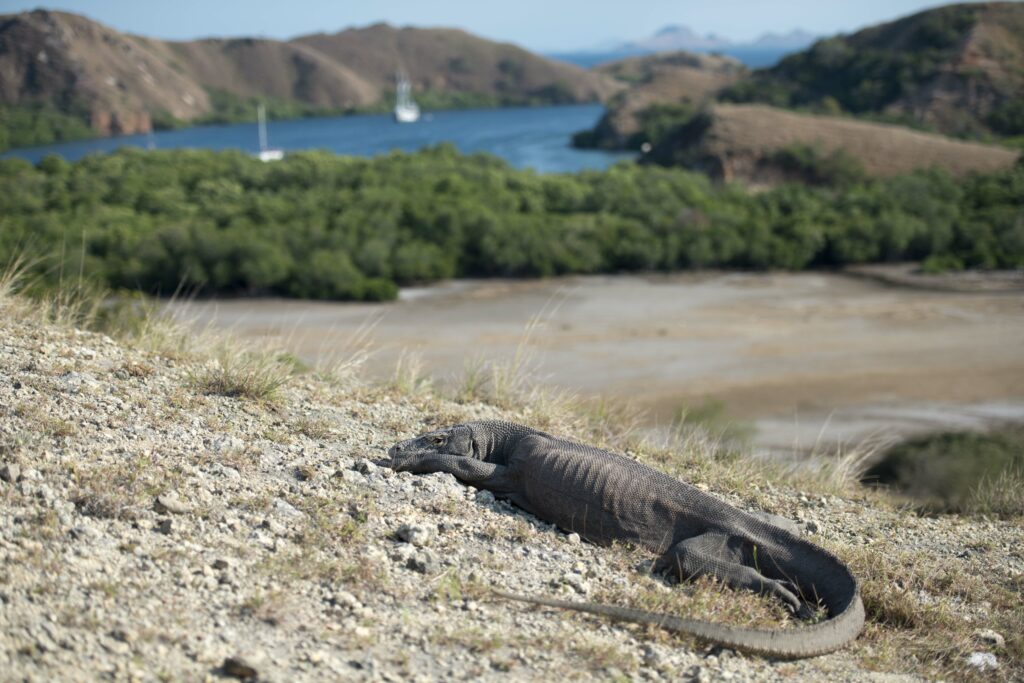
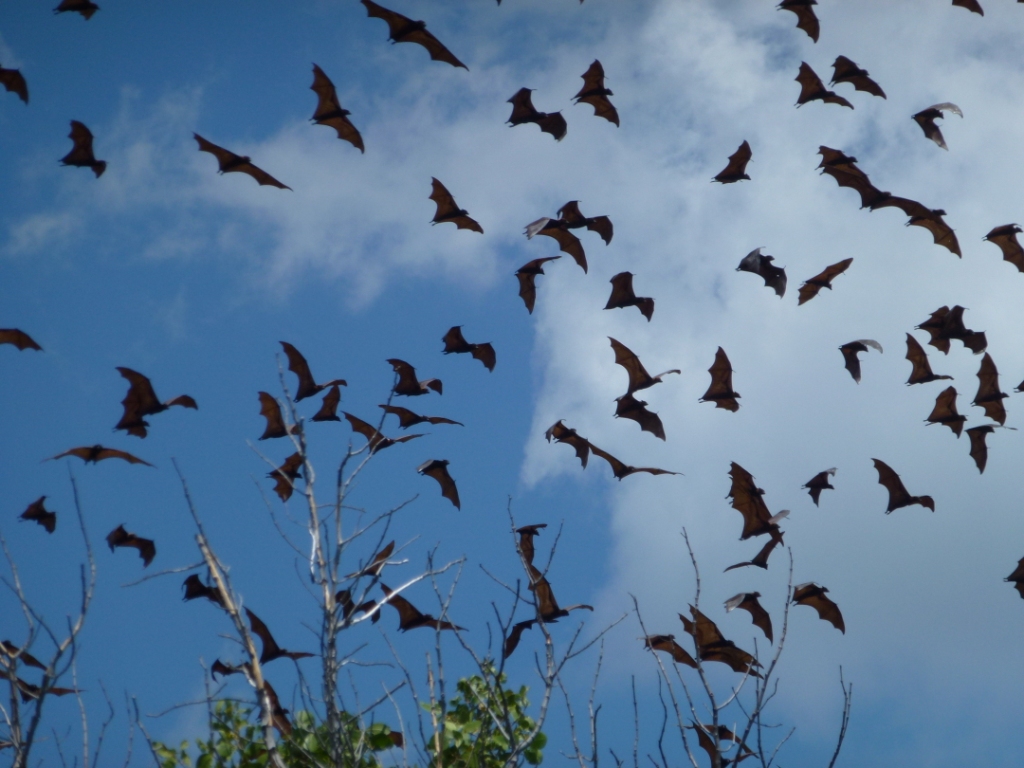
Flights:
- Bali to Labuan Bajo on the mainland of Flores (daily), and
- Bali to Bima in Sumbawa at the other side of the Park (daily).
Attractive alternatives:
Board The Seven Seas in Benoa Harbour, Bali, and sail to Komodo National Park in 5 days. You get to enjoy the beautiful landscape of Lombok, Sumbawa and Sangean Volcano. Delight in some excellent dives on the way and don’t forget to catch a tuna at Sangean! This cruise is also offered in reverse direction, from Komodo to Bali. Contact us for more information.
- Superb for diving and snorkeling
- Hikes of 45 mins to 2.5 hrs to see the Komodo dragons, wild deer, horses and buffaloes
- Deserted beaches and surrounding hills are ideal for your sunset drinks on the beach
- Bays where the boat will anchor are perfect for afternoon water-skiing
- Slow tours with one of the tenders or kayaks to explore the coastline from the water
- Fishing is allowed in the pelagic fishing zone and outside the National Park
- Near Sangean Island, troll for tuna, Spanish mackerel, sail fish and giant trevally
| Southeast Monsoon Season: | May through October |
| North West Monsoon Season: | December through March |
| Change-over Months: | April and November |
| Air temperature: | 27 – 32°C |
| Water temperature: | Generally ranging from 24 to 30°C. Warmest in the North and coolest in the South during the Southeast Monsoon season while patterns are reversed during the North West Monsoon season. |
| Best time to dive: | Year Round with best diving in the North during South East Monsoon and best diving in the South during North West Monsoon. |
| Other interesting info: | Dive conditions vary with the tides, throughout the day. Therefore it is important to dive with the tide tables to hit every site at the optimal time. This is where your Seven Seas crew and dive guides excel! |
Southern waters: Generally provide better visibility from December through April. Lower visibility in the dry season – in the south – is due to oceanic up-welling and plankton richness, which makes this area very rich in marine life, especially invertebrates. An underwater photographers dream! Highest temperatures in the south are during the rainy season. Click here for our Deep South Komodo cruises.
Northern waters: Generally provide better visibility year round. Water temperature is usually higher. Fish are abundant everywhere but the rocks and reefs in ‘current’ areas provide the best chances for spotting the bigger fish, especially the sharks and pelagics.

